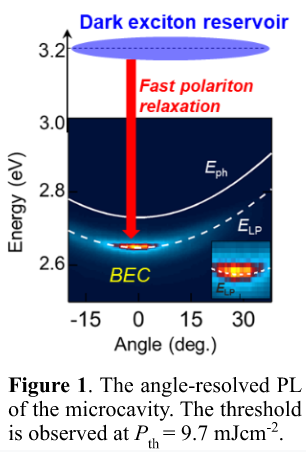Exciton-Polariton Condensation in Organic Microcavities; Polariton Relaxation and Polariton Dephasing Dynamics
Tomohiro Ishii Polytechnique Montreal
Tomohiro Ishii (a), Kiyoshi Miyata (b), Masashi Mamada (c), Ayano Abe (c), Masaki Saigo (b), Fatima Bencheikh (c), Fabrice Mathevet (c, d), Ken Onda (b), Felipe Herrera (e), Stéphane Kéna-Cohen (a), Chihaya Adachi (c, f)
(a) Department of Engineering Physics, Polytechnique Montréal, Canada
(b) Department of Chemistry, Kyushu University, Japan
(c) Center for Organic Photonics and Electronics Research (OPERA) and Department of Applied Chemistry, Kyushu University, Japan
(d) Institut Parisien de Chimie Moléculaire, Sorbonne University, France
(e) Department of Physics, Universidad de Santiago de Chile, Chile
(f) International Institute for Carbon Neutral Energy Research, Kyushu University, Japan
Exciton-polaritons, in which the electronic state of an excited organic molecule and a photonic state are strongly coupled, can form a Bose-Einstein condensate (BEC) at room temperature [1]. However, so far, the reported thresholds of organic polariton BECs under optical excitation are in the range of Pth ~ 2.2 - 500 μJ cm-2. One route towards lowering the condensation threshold is to increase the polariton relaxation rate (Wep) [2, 3, 4], but the relationship of Wep with a condensation threshold has not been fully explored. In this study, we demonstrate a room-temperature polariton condensate at a threshold pump fluence of 9.7 ± 0.1 μJ cm−2, in a microcavity containing 4,4’-bis((E)-4-(3,6-bis(2-ethylhexyl)-(9H-carbazol-9-yl))styryl)-1,1’-biphenyl (BSBCz-EH). Notably, this class of organic materials is the only one which has demonstrated the possibility of electrically-pumped lasing. By using a semiclassical model to describe the polariton kinetics, we reveal that the low polariton BEC threshold results from the rapid relaxation rate from the dark exciton reservoir to the set of the lower polariton states forming the condensate, indicating that accelerating polariton relaxation is an important factor for realizing low-threshold polariton condensates (Fig. 1) [3]. In addition, we reveal that polariton dephasing reduces the efficiency of the polariton relaxation, which prevents the low threshold polariton BEC.

[1] S. Kéna-Choen, S. R. Forrest, Nature Photon. 2010, 4, 371.
[2] L. Mazza et al., Phys. Rev. B 2013, 88, 075321.
[3] T. Ishii et al., Adv. Opt. Mater. 2021, 9, 2101048.
[4] T. Ishii et al., Adv. Opt. Mater. 2022, 10, 2102034.